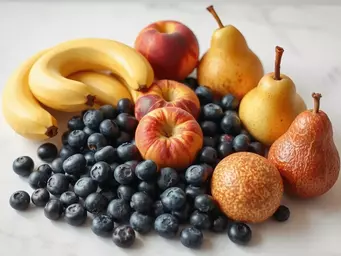Fiber's Impact on GERD Relief

Are you often caught in the cycle of discomfort and frustration due to gastroesophageal reflux disease (GERD)? Understanding the nuances of this chronic condition is key to regaining control over your daily life and well-being. Here are the essential insights you will gain from this article.
What You Will Learn
- GERD is a chronic condition that causes recurrent symptoms such as heartburn, regurgitation, and difficulty swallowing.
- Recognizing food triggers is essential; common offenders include spicy foods, citrus fruits, and fried items.
- Incorporating a fiber-rich diet can significantly improve digestive health and reduce GERD symptoms.
- Sustainable dietary changes and weight management through fiber can enhance overall quality of life for GERD sufferers.
GERD Management: Symptoms, Impact, and Dietary Benefits
Understanding GERD involves recognizing its symptoms, how it impacts daily life, and the benefits of a fiber-enriched diet. This visual summarizes key aspects.
Common GERD Symptoms Checklist
- ✓ Heartburn (burning chest sensation)
- ✓ Regurgitation (sour taste)
- ✓ Dysphagia (difficulty swallowing)
- ✓ Coughing or wheezing (especially at night)
Impact on Daily Life
- ● Dietary Restrictions & Frustration
- ● Sleep Disruption & Fatigue
- ● Emotional Health (Anxiety/Depression)
Common Food Triggers
- ■ Spicy Dishes
- ■ Citrus Fruits & Tomato Products
- ■ Fried & Fatty Foods
- ■ Chocolate & Mint
Long-Term Benefits of Fiber-Enriched Diet
Understanding GERD: Symptoms and Challenges
Gastroesophageal reflux disease (GERD) is more than just the occasional heartburn; it's a chronic condition that can affect your everyday life. Many of my patients often describe a burning sensation in the chest, regurgitation of food or sour liquid, and difficulty swallowing. Understanding these symptoms is the first step in managing GERD effectively! Let’s delve deeper into what GERD truly is and how it can impact your well-being.
When we talk about GERD, we're referring to the backward flow of stomach acid into the esophagus. This occurs when the lower esophageal sphincter (LES) relaxes inappropriately or weakens. Common symptoms include:
- Heartburn: A burning sensation in the chest, often after eating.
- Regurgitation: A sour or bitter taste in the mouth.
- Dysphagia: Difficulty swallowing.
- Coughing or wheezing: Particularly at night.
Recognizing these symptoms is crucial for diagnosis and subsequent management strategies. If you're experiencing these symptoms frequently, it’s important to consult a healthcare provider who can guide you through your options. For a comprehensive overview of GERD symptoms and diagnosis, you can refer to this article on GERD management from the National Institutes of Health.
What is GERD and Its Common Symptoms?
GERD is a chronic digestive condition that, if left untreated, can lead to more serious health issues. Many people experience symptoms sporadically, but those who suffer from GERD often find their symptoms recurring and persistent. What’s important is not just identifying the symptoms, but also understanding how they can impact your daily life.
Some individuals may find it challenging to enjoy meals, sleep comfortably, or engage in physical activities. This not only affects physical health but can take a toll on emotional well-being. In my practice at What is Acid Reflux, I’ve seen firsthand how much GERD can disrupt everyday routines, leading to anxiety about eating out or social gatherings.

The Impact of GERD on Daily Life
Living with GERD can be a constant battle. Many of my patients report feeling restricted in their dietary choices, which can lead to frustration and social isolation. Here are some of the most significant impacts:
- Dietary Restrictions: Many foods can trigger symptoms, leading to a limited diet.
- Sleep Disruption: Symptoms often worsen at night, affecting sleep quality.
- Emotional Health: Anxiety or depression due to chronic discomfort.
This constant vigilance can be exhausting, but there are effective strategies for managing GERD. It’s essential to recognize the challenges and seek support. Remember, you’re not alone on this journey!
Identifying Food Triggers for GERD Symptoms
One of the most effective ways to manage GERD symptoms is by identifying and avoiding personal food triggers. Foods that commonly provoke symptoms include:
- Spicy dishes
- Citrus fruits
- Tomato-based products
- Fried and fatty foods
- Chocolate and mint
Keeping a food diary is a fantastic way to uncover your specific triggers. By noting what you eat and your symptoms, you can start to see patterns that will help you make informed dietary choices. This proactive approach can empower you to regain control over your digestive health!
We Want to Hear From You!
As you navigate your journey with GERD, we’d love to know: What strategies have you found most helpful in managing your symptoms? Share your experiences with us below!
Long-Term Benefits of a Fiber-Enriched Diet for GERD
When it comes to managing GERD, the benefits of a fiber-enriched diet go far beyond just relieving symptoms. Fiber plays a crucial role in enhancing overall digestive health, which can lead to a significant improvement in quality of life. By incorporating more fiber into your meals, you may experience lasting changes that can elevate your daily comfort and well-being.
Not only can fiber help lessen the frequency and intensity of GERD symptoms, but it can also contribute to improved digestion and a more balanced gut microbiome. When your digestive system functions better, you may find that you feel more energetic and less burdened by discomfort. Research has shown that adequate fiber intake can reduce GERD symptoms, emphasizing its role in digestive health.

Improving Quality of Life Beyond Symptom Relief
Living with GERD often means navigating a sea of uncertainties. However, adding fiber to your diet can provide a sense of stability. Here are some of the ways a fiber-rich diet can improve your overall quality of life:
- Enhanced digestive function, leading to fewer flare-ups
- Increased energy levels as your body absorbs nutrients more effectively
- Better mood and emotional well-being due to reduced discomfort
- Greater confidence in food choices, knowing you’re making healthier decisions
With these improvements, managing GERD can feel like less of a struggle. Remember, it’s not just about symptom relief but also about reclaiming your life!
Maintaining Dietary Changes: Sustainability and Lifestyle Adjustments
Making lasting dietary changes can be challenging, but it’s essential for long-term GERD management. To help integrate fiber into your daily routine sustainably, consider the following strategies:
- Start slowly: Gradually increase fiber intake to avoid digestive upset.
- Stay hydrated: Drink plenty of water to help fiber do its job properly.
- Plan meals in advance: This makes it easier to include fiber-rich foods.
- Experiment with recipes: Find tasty dishes that include whole grains, fruits, and vegetables.
As a gastroenterologist, I often encourage my patients to embrace gradual changes. This way, the new habits become second nature, making it easier to maintain a fiber-rich diet over time. For more information on the impact of diet on GERD, you can explore this study on dietary approaches to GERD.
Weight Management and Its Connection to Fiber Intake
Weight management is another significant benefit of a fiber-enriched diet, especially for those dealing with GERD. Foods high in fiber tend to be more filling, which can help control hunger and promote healthier eating habits. Here’s how fiber plays a role in weight management:
- Increased satiety from fiber-rich foods can reduce overall calorie intake.
- Higher fiber diets are often lower in unhealthy fats and sugars.
- Improved digestion can lead to a more efficient metabolism.
By focusing on fiber, you not only support your digestive health but also work toward achieving and maintaining a healthy weight. This dual benefit can be a powerful motivator in your journey toward wellness.
Frequently Asked Questions About GERD and Fiber
- What are the most common symptoms of GERD?
- The most common symptoms of GERD include heartburn (a burning sensation in the chest), regurgitation (sour taste), dysphagia (difficulty swallowing), and sometimes coughing or wheezing, especially at night.
- How does GERD impact daily life?
- GERD can significantly impact daily life through dietary restrictions, leading to frustration and social isolation, disruption of sleep due to worsened symptoms at night, and negative effects on emotional health such as anxiety and depression.
- What foods commonly trigger GERD symptoms?
- Common food triggers for GERD symptoms include spicy dishes, citrus fruits, tomato-based products, fried and fatty foods, chocolate, and mint.
- How can a fiber-enriched diet help manage GERD?
- A fiber-enriched diet can help manage GERD by enhancing digestive function, increasing satiety for weight management, and contributing to a healthier gut microbiome, which can lead to fewer flare-ups and improved overall well-being.
- Are there any long-term benefits of a fiber-rich diet for GERD sufferers?
- Yes, long-term benefits include enhanced digestive function, increased energy levels, better mood and emotional well-being due to reduced discomfort, sustainable weight management, and greater confidence in food choices.
Recap of Key Points
Here is a quick recap of the important points discussed in the article:
- Recognize Symptoms: Common symptoms of GERD include heartburn, regurgitation, dysphagia, and coughing or wheezing.
- Identify Food Triggers: Keeping a food diary can help identify personal triggers to manage symptoms effectively.
- Incorporate Fiber: A fiber-enriched diet can enhance digestive health and improve overall well-being.
- Plan Dietary Changes: Gradually increase fiber intake, stay hydrated, and plan meals to maintain sustainable dietary changes.
- Emotional Well-being: Managing GERD involves not only physical health but also addressing emotional health and anxiety related to the condition.









